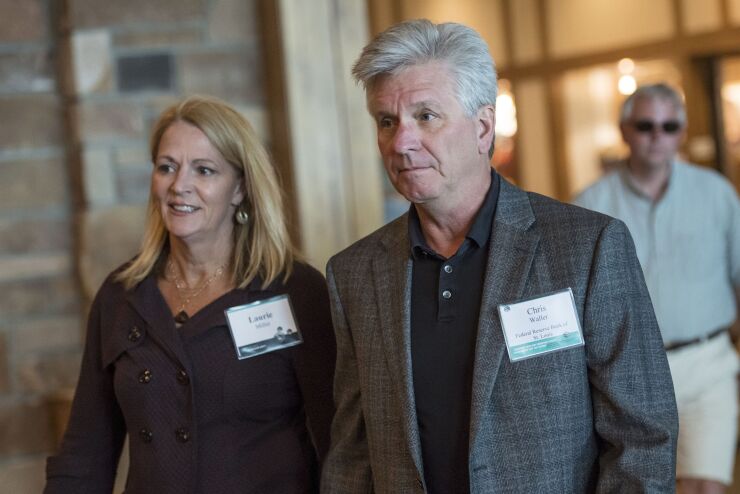
Federal Reserve Gov. Christopher Waller set the record straight about the central bank's instant payment system, which is set to debut this summer.
During a Thursday afternoon appearance at the University of Southern Florida's Sarasota campus, Waller addressed some of the
"It's just like ACH, Fedwire — these payment systems that we already have in place, both in the private sector and at the Fed," Waller said. "So, there's nothing nefarious about FedNow, it's just a payment rail that will clear things much faster."
The system will allow for money to move 24 hours a day, seven days a week and much quicker than the current most popular settlement system, the automated clearing house. Waller said transactions will be processed in as little as two seconds, instead of between one and three days for ACH.
Yet, while this marks a significant step up in the Fed's capabilities, Waller said, it does not require the development or issuance of a digital dollar, as some have asserted. He noted that The Clearing House's privately operated Real-Time Payments, or RTP, system, provides the same speed of service without a CBDC.
"These are just payment systems," he said. "They're just affecting the speed at which payment requests get made and settled and cleared."
Waller noted several potential use cases for FedNow, including firms paying workers — especially hourly workers or contractors — immediately upon completing a task, investors posting collateral for options trading, consumers making essential payments at night or on weekends, and sending payments to friends and family, though he noted that peer-to-peer payments will not be available when the system
"We're going to launch it, it's going to start kind of basic and small and then over time we're going to expand it out," he said. "And, hopefully, we'll grow it into viable options for people to do real-time payments."
Overall, he said, he expects the proliferation of instant payments, both from the Fed and the private sector, resulting in less credit risk and therefore greater efficiency.
Waller noted that technology has already had a demonstrable impact on the speed of activity in the banking sector, pointing to the run on deposits at Silicon Valley Bank that ultimately led to the institution's failure last month.
"In the old days, a bank run was kind of slow. You had to go to the bank, stand in line to get your cash, argue with Jimmy Stewart whether you needed all $20 or $2. They were slow," he said. "Well, what we saw with Silicon Valley Bank was the power of speed in electronic transfers of payments through your phone, through a simple app."
Despite the heightened efficiency of modern bank runs, Waller said the fundamental issues they present are the same as they were when the Fed and Federal Deposit Insurance Corp. were created. Ultimately, he said, they are a matter of confidence. If enough deposits are withdrawn, banks will always fail. But, he added, the Fed's tools for instilling confidence, including its discount window and emergency relief systems such as the bank term funding program launched in the wake of last month's failures, are far greater than those that regulators used to have at their disposal.
"Once those things got set up, things kind of calmed down. We haven't seen run behavior on any other banks in the last month. Everything seems to be okay," he said. "That's the one thing about a bank run, it's a panic. Once it stops, there's no real fundamental damage to the economy or the banking system, per se."
During prepared remarks, Waller reiterated his belief that positive benefits could be derived from innovation in the crypto asset sector, a view that sets him apart from
Along with distributed ledger — or blockchain — technology,
Waller noted that beyond digital assets, tokenization has proven effective in foreign exchange trading and with same-day repurchase agreements.
"These efforts are still in early stages, but I expect that as functionality expands with more currencies, eligible securities, and new products, there will be more participation and growth," he said.
Waller also highlighted artificial intelligence as a category of innovation that has benefited banks in a variety of ways, including generating personalized products for customers and underpinning chatbot software. The technology, he said, could also be used to detect fraud, underwrite loans and assess creditworthiness more effectively.
Both tokenization and artificial intelligence deserve some degree of scrutiny, he said, but they should not be dismissed out of hand.
"All of these innovations will have their champions, who make claims about how their innovation will change the world, and I think it's important to view such claims critically," Waller said. "But it's equally important to challenge the doubters, who insist that these innovations are much ado about nothing, or that they will end in disaster. The world will change, and we should encourage innovations that show promise for benefitting society, including the financial services sector."






